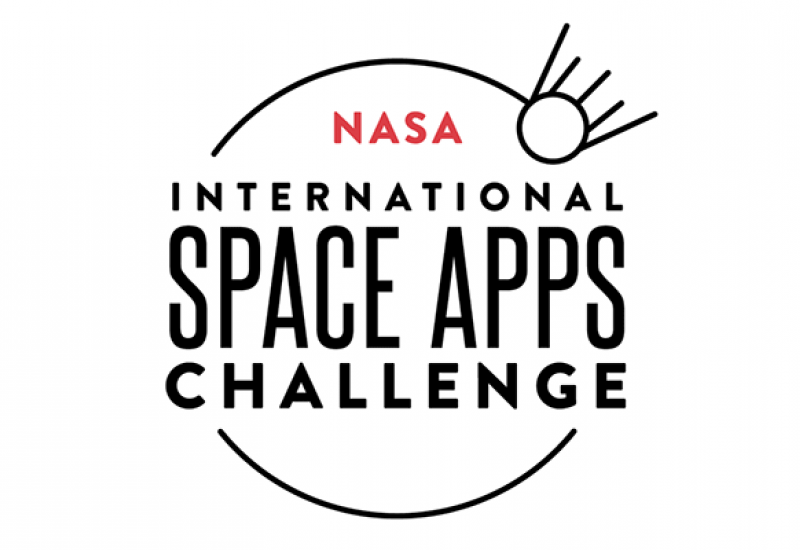In early October 2021, with the support of the National Aeronautics and Space Administration, the local phase of the NASA International Space Apps Challenge took place. The NGO “Noosphere Association” hosted the event in Dnieper. The theme of the 10th-anniversary hackathon was “The power of ten”. Participants from the whole world came together to address real-world problems on Earth and in space in 48 hours.
Igor Sikorsky Kyiv Polytechnic Institute students have been the best at the hackathon for three years in a row. The Educational and Research Center “Noosphere Engineering School KPI” established in 2020 assisted the students in training.
This year, our University student teams attended the online hackathon: “pEAky ailerons” (IAT), “Insomnia on a cosmic scale” (IAT), “Oste s team” (the select team of IAT and the Taras Shevchenko National University of Kyiv), “AboveTheSky” (FEL), “Destroyers of anything” (FEL), “Little living planet” (FEL and FRE select team). Senior Lecturer at the Department of Electronic Devices and Systems Hanna Saryboga mentored the FEL teams and two teams of schoolchildren – JASU members: “DND” and “Space Healers”. All student companies successfully presented their projects, received high scores, gifts from the NGO “Noosphere Association”, and participation certificates.
What kind of projects have the teams developed?
“Oste s team” - Henrikh Titov, Yurii Vasylyshyn, Maksym Tatarovskyi, Elina Dudka, Andrii Shportko, and Oleksandr Lukin - has developed a program prototype that can build an asteroid brightness curve based on its 3D model. The ready project has been published on GitHub. The team wants to improve the program and make it handy. It is the team-winner of the hackathon and will compete in the finals of the international stage.
The “pEAky ailerons” team from the EUROAVIA student association worked on a system for detaching a parachute without using pyrotechnics (“Let It Go Without a Bang” Challenge). The team included: Sofiia Voieikova, Olha Astakhova, Yurii Tereshchenko, Heorhii Tarash, Vitalii Hula. Together they have designed a hydraulic mechanism for cutting the parachute cords. Their device is cheap, elementary, and reusable. The team plans to develop its project further.
The team “Insomnia on a cosmic scale” had the same task: Polina Sudyma, Bohdan Voitsekhovskyi, Vladyslav Zholudenko, Kostiantyn Nabilskyi, Oleksandr Domatiuk, and Mykhailo Lukash. The team has designed the concept of a simple electromechanical reusable parachute disconnector. One can also use it to disconnect various elements in space, for instance, disconnecting a satellite from a stage, deploying solar panels, and others.
The “AboveTheSky” team consisted of Vadym Dzyhun, Dmytro Semenchenko, and Dmytro Motylov. They competed in the “Near-Space Near You” challenge. "AboveTheSky" reported on stratostats: what types there are and what they are used for and presented a guide (Action Program - Ed.). The instructions will be of great help for everyone who wants to create a cheap high-altitude ball, launch it and conduct further space exploration.
The team “Destroyers of anything” - Mykhailo Podolian, Kateryna Uladovska, and Andrii Marchuk - chose the challenge “Let it go (without a bang)”. They have developed a device that disconnects parachute cords with a capsule with an aluminum-thermite mixture.
“Little living planet” consisted of FEL students Vitalii Rudyk, Vitalii Marhara, Andrii Korzh, and FRE student Ivan Zahorulko. Together they chose the topic “Have seeds will travel”. They proposed an autonomous system for growing food (mushrooms and vegetables) in space. They also provided for a bioreactor converting organic waste into fertilizer.
For Roman Boldak and Tymur Chertkov – the “DND” team members – “Things are heating up!” became the challenge. They have developed a telegram bot warning of chemical threats in a particular region and giving clear instructions. The bot also informs the relevant agencies that should localize the endangerment. Data is collected from NASA satellites and updated in real-time.
Khrystyna Bindiouk and Anhelina Dromova from “Space healer” have won third place in the competition “The Trail to Mars: Can You Keep Your Crew Alive”. They have developed a telegram bot that helps you test your knowledge of the risks associated with a human flight into space and feel like a spaceship captain. By the way, this team also became a finalist of the TechnoArtKPI-2021 hackathon.
All hackathon team-winners will compete in the finals of the international stage of the competition.

